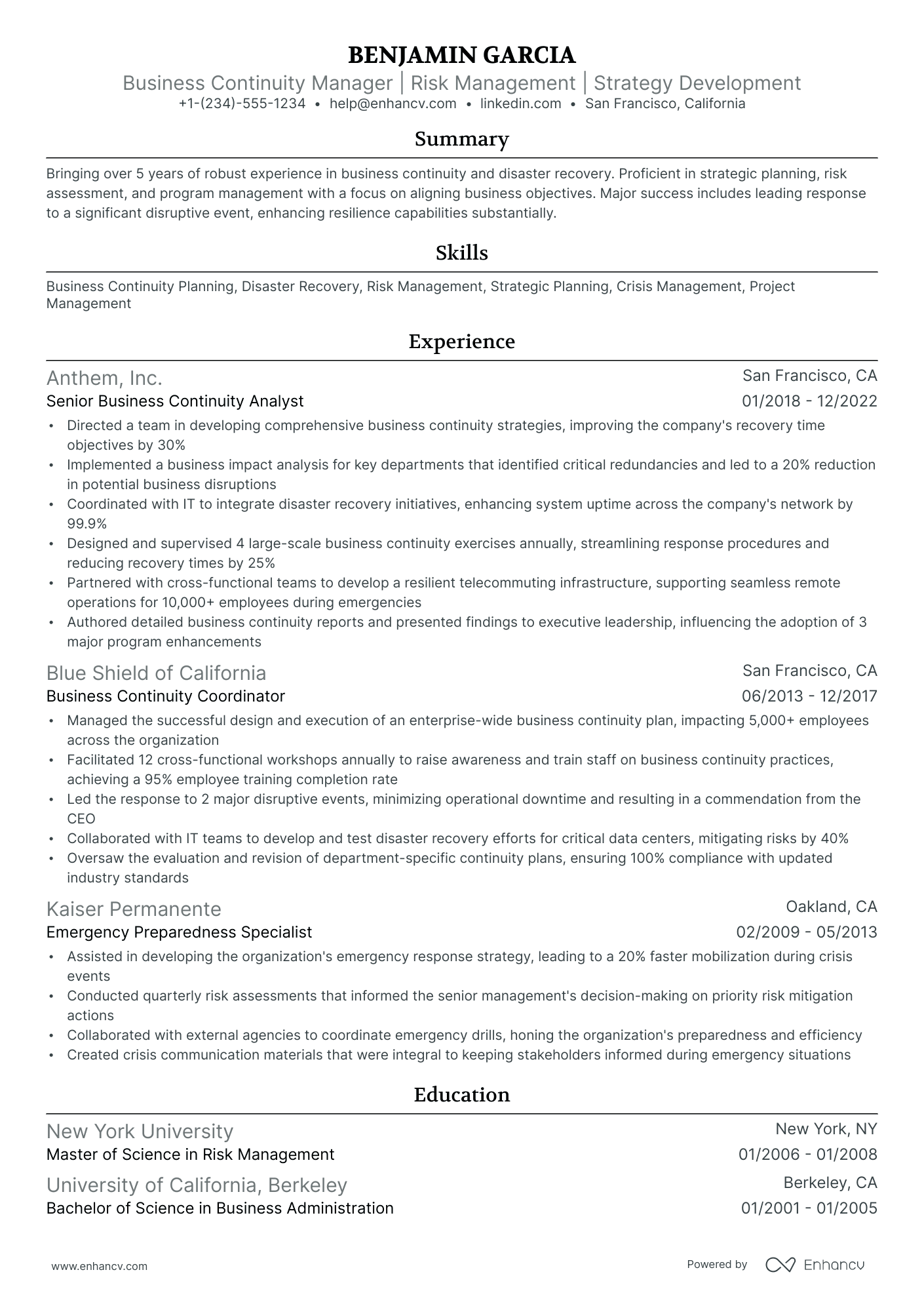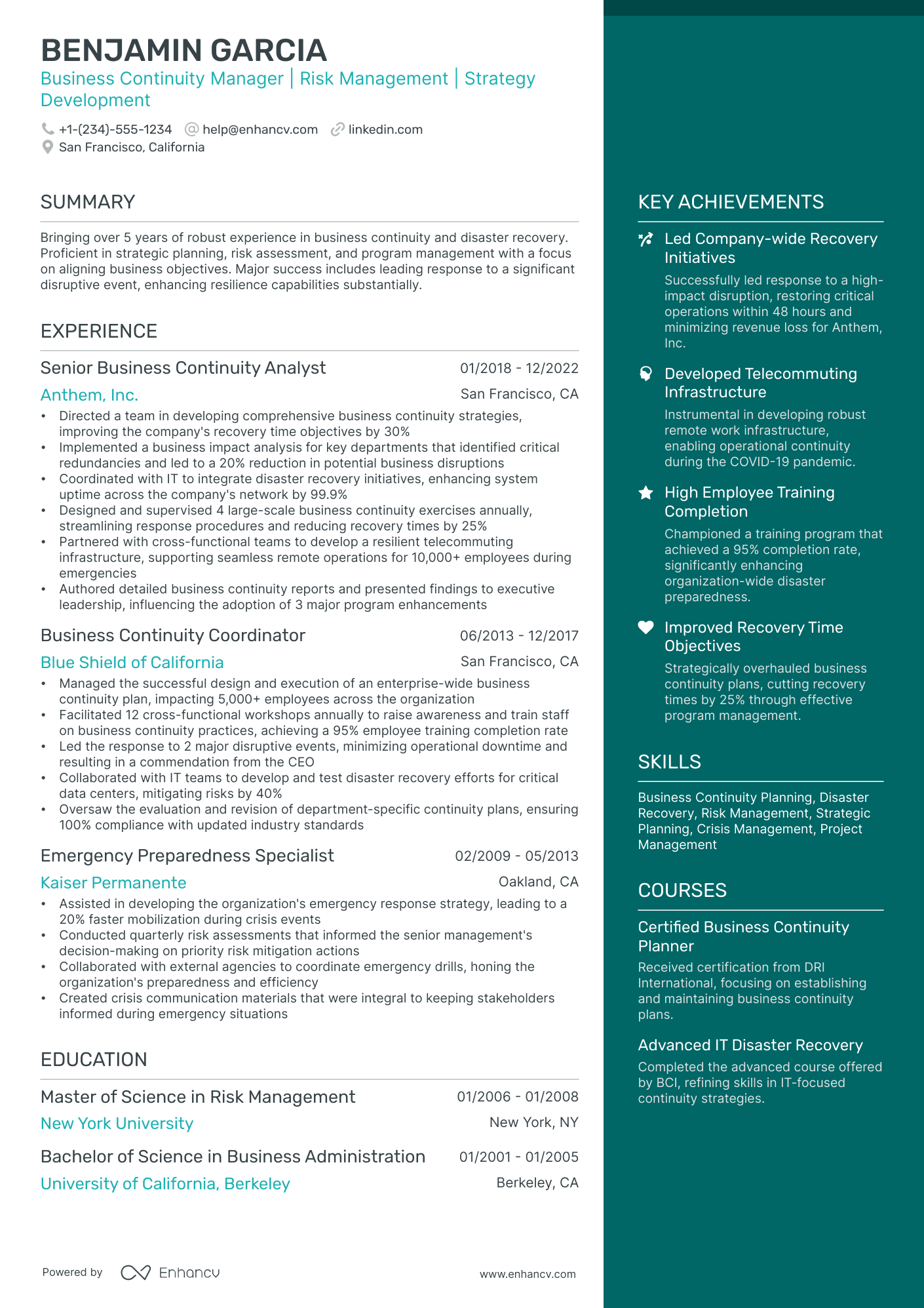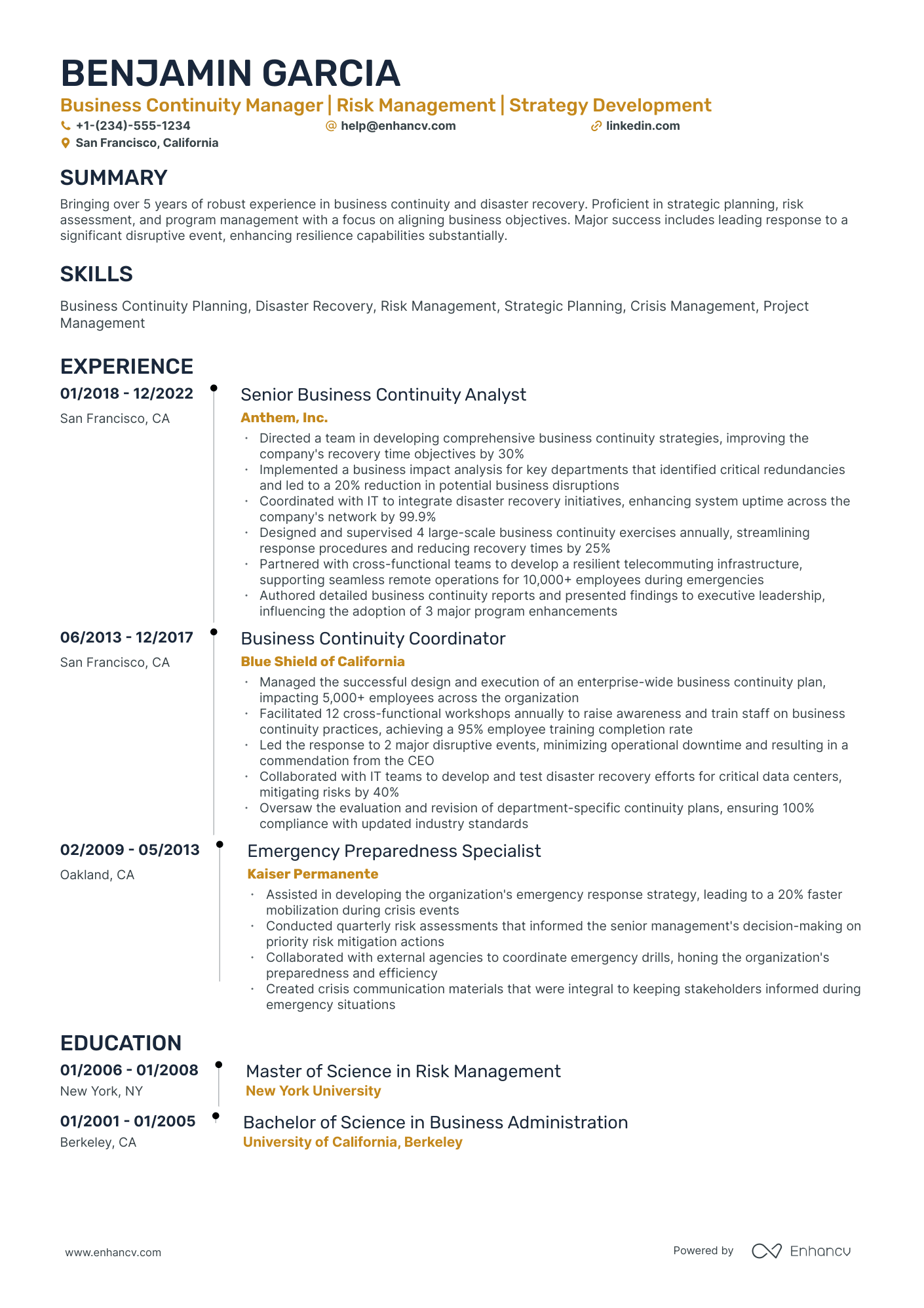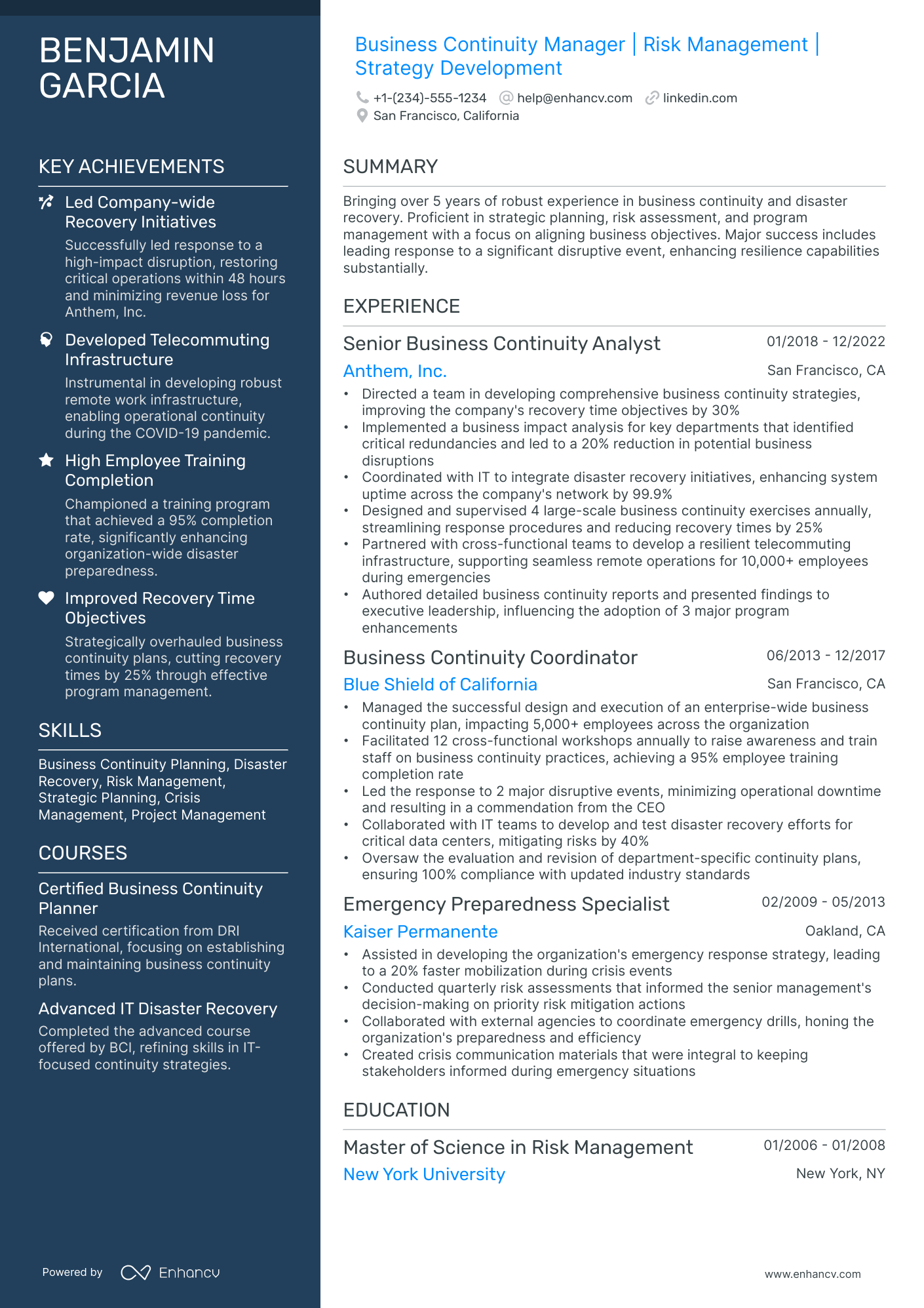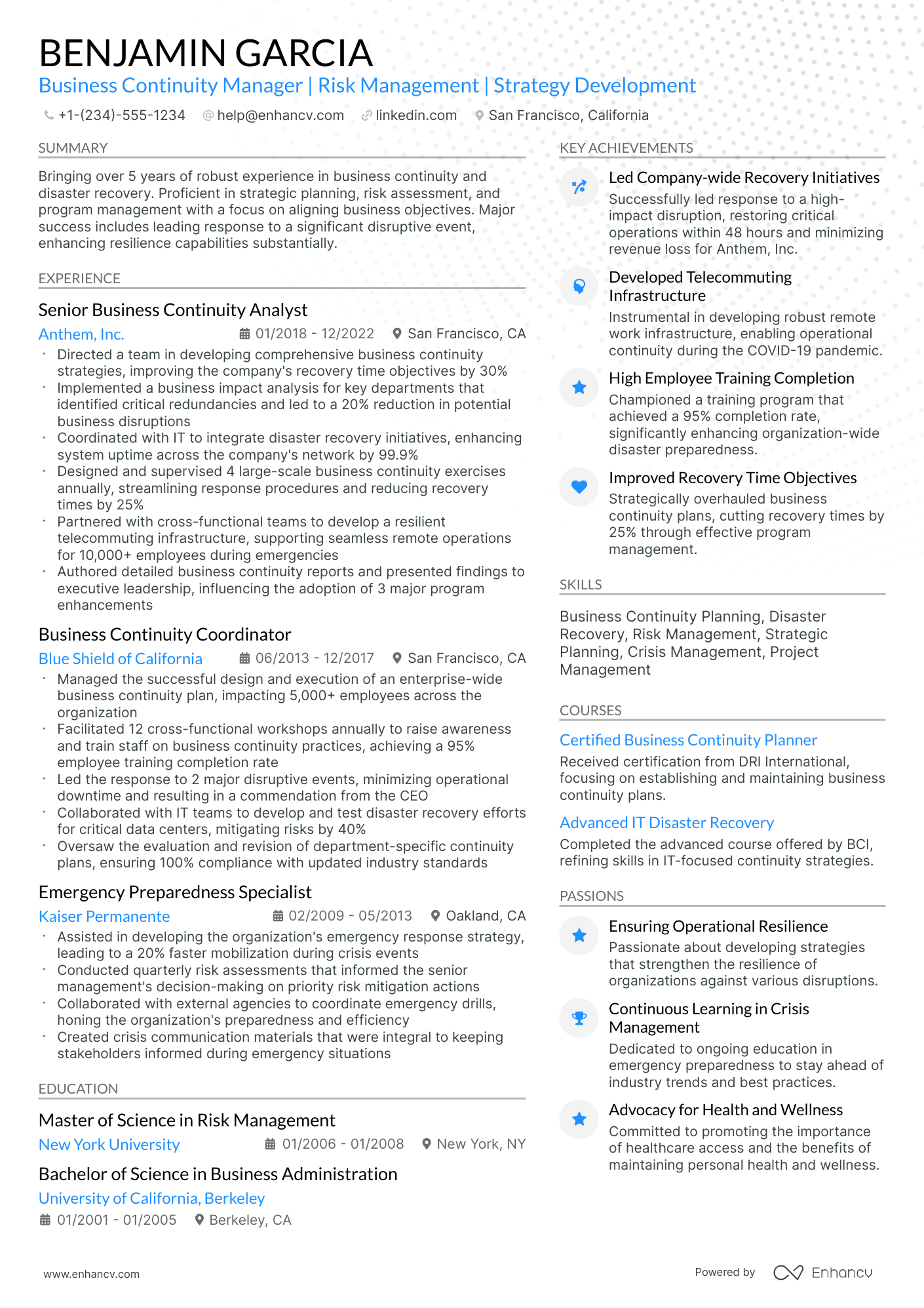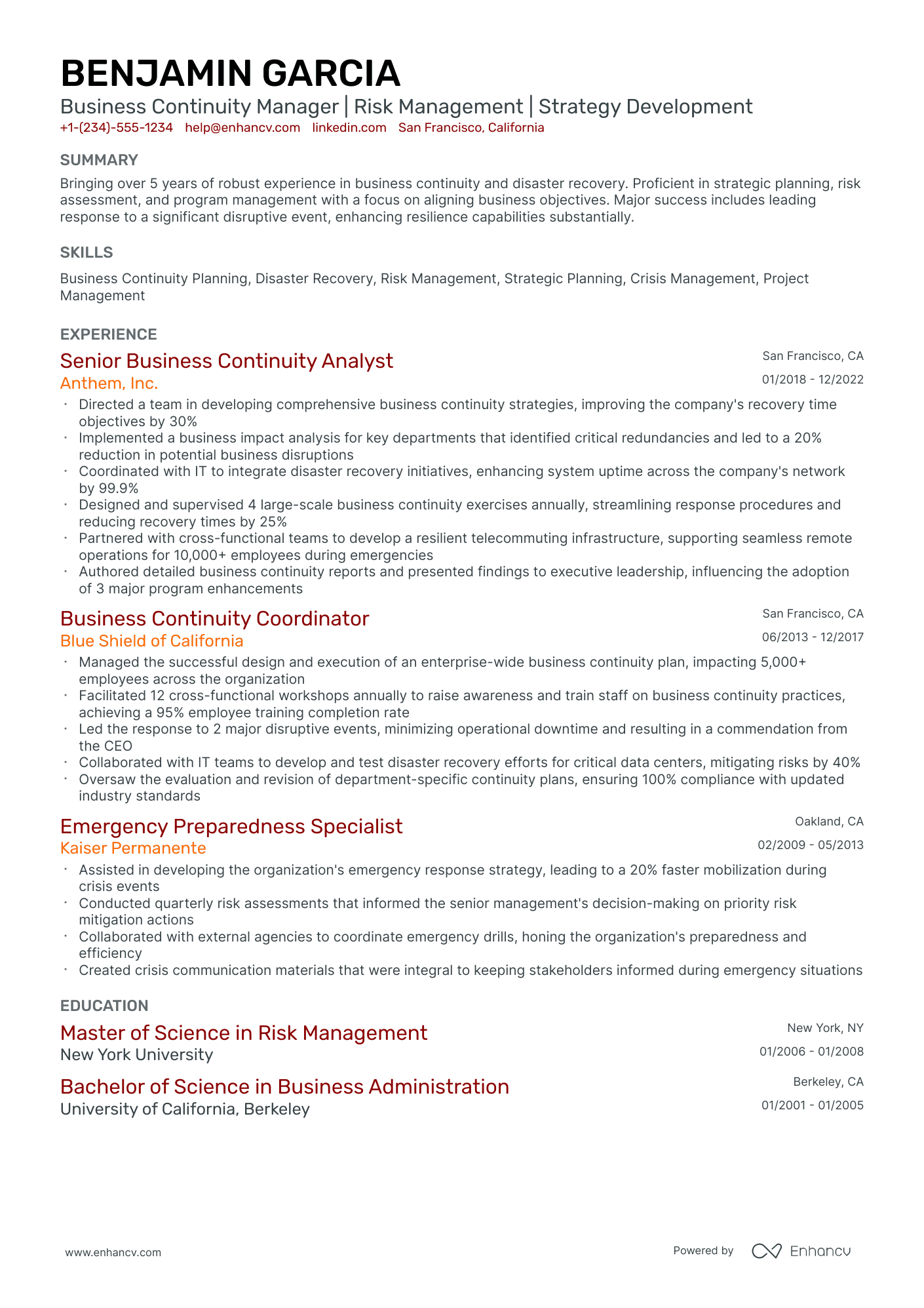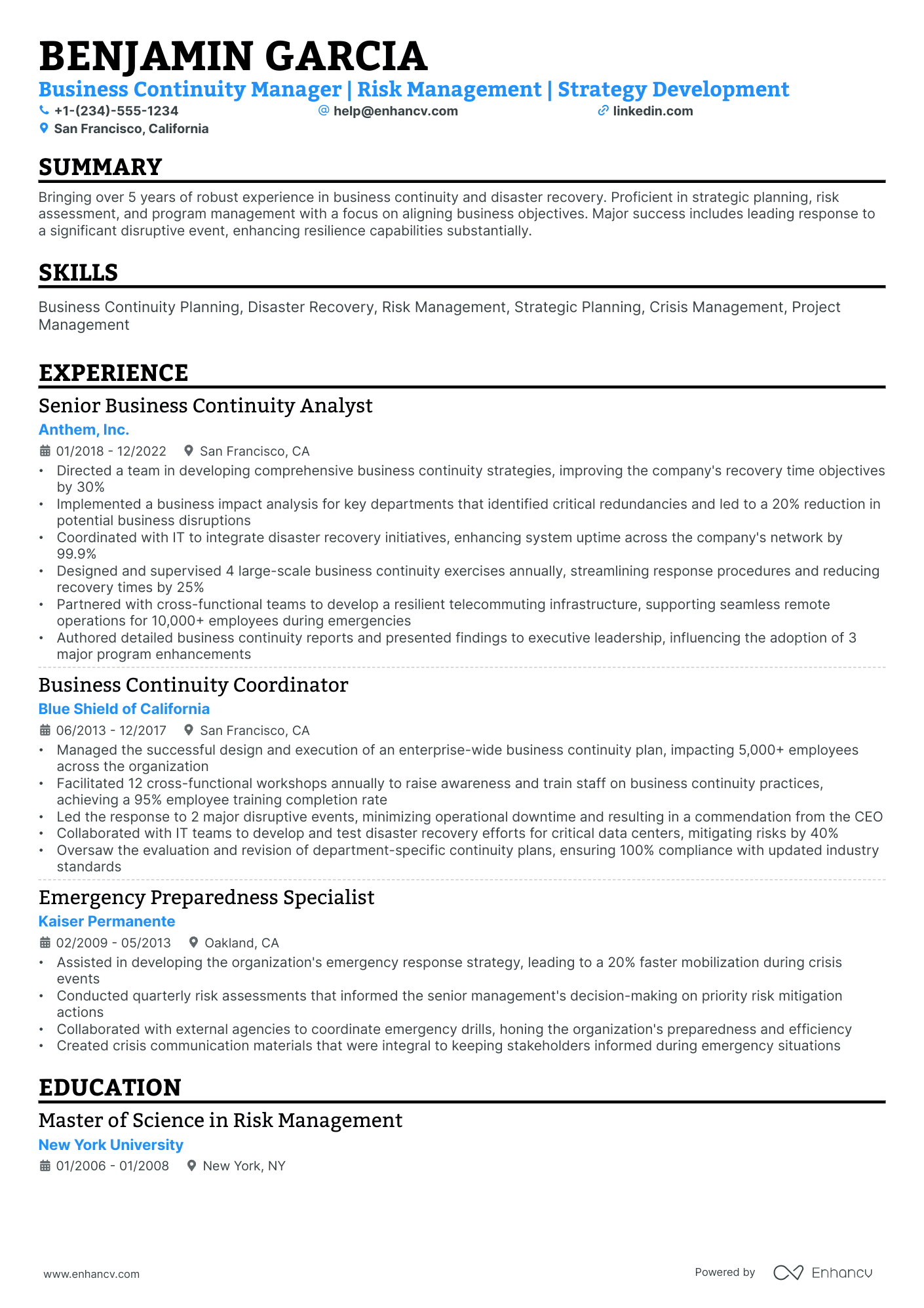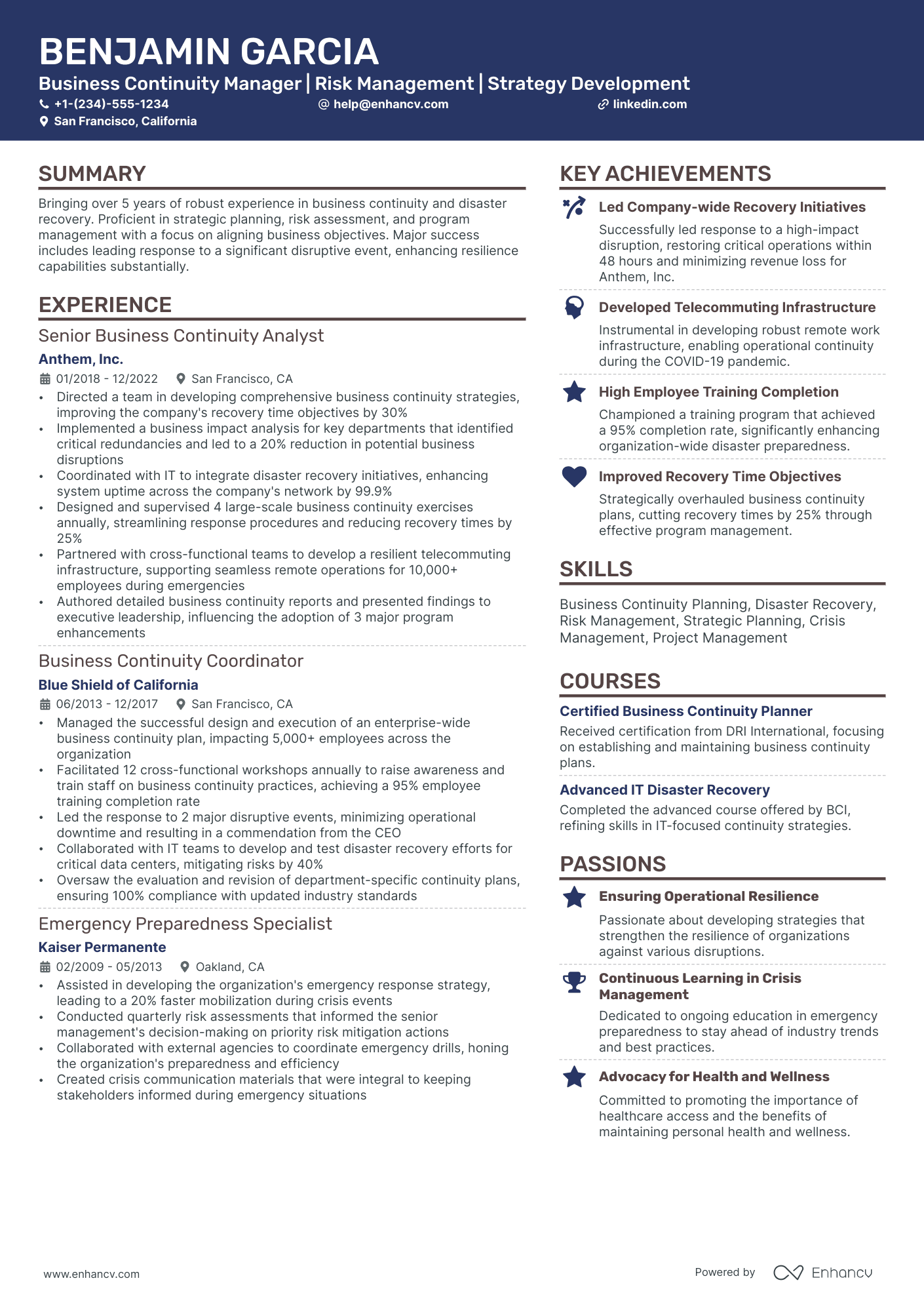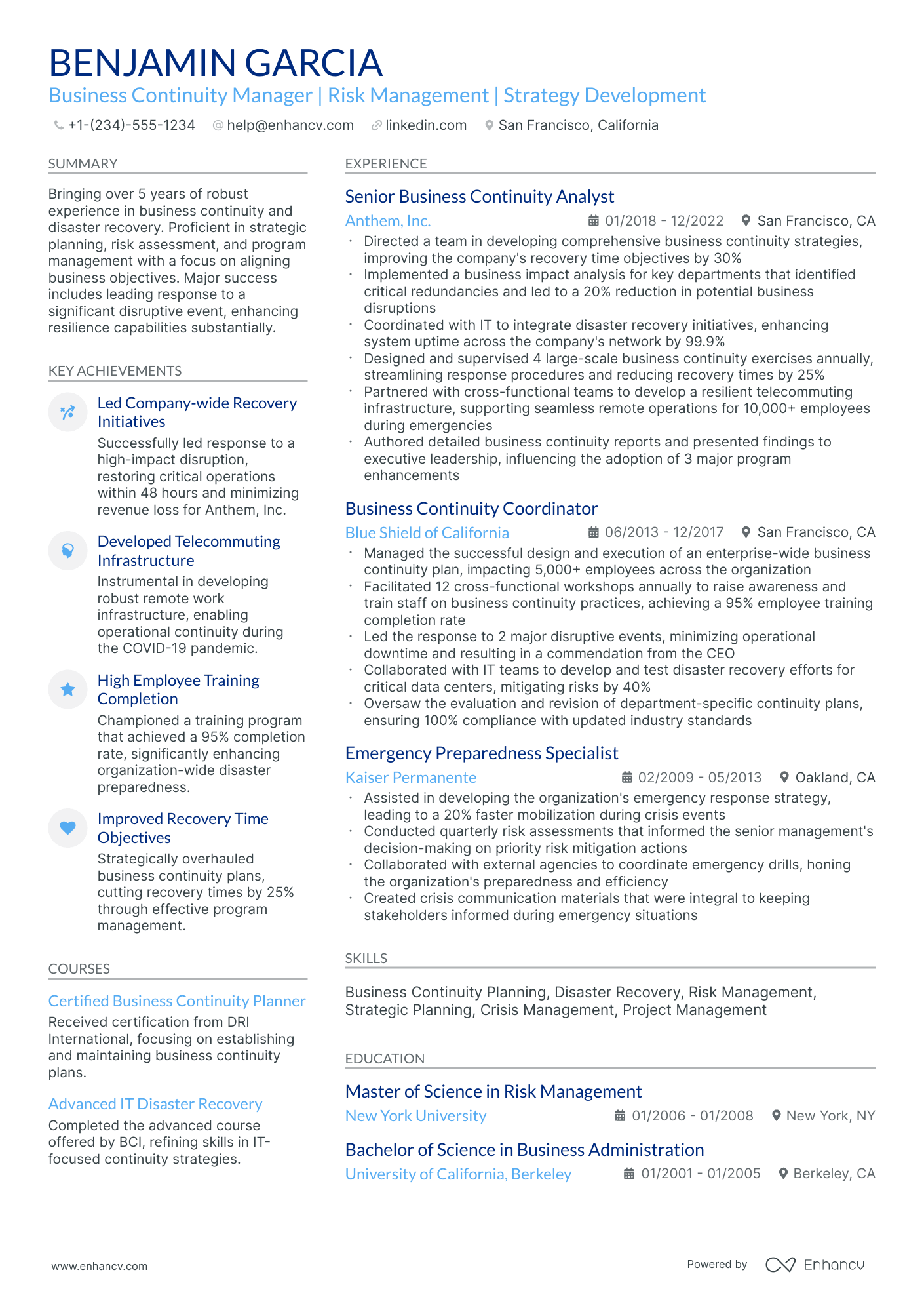As a business continuity manager, one challenge you might face is articulating the complexity of your disaster recovery strategies in a concise and understandable way on your resume. Our guide offers targeted advice on how to effectively summarize your expertise and achievements in business continuity, ensuring that potential employers grasp the full value of your experience without getting lost in technical jargon.
- Utilize real-life examples to refine your business continuity manager resume;
- Effectively write the experience section of your business continuity manager resume, even if you have minimal or no professional experience;
- Incorporate the industry's top 10 essential skills throughout your resume;
- Include your education and certifications to highlight your specific expertise.
If the business continuity manager resume isn't the right one for you, take a look at other related guides we have:
Don't stress out over your business continuity manager resume format
Remember, the elaborate design of your business continuity manager resume isn't what impresses recruiters most. They are primarily searching for candidates who meet the job requirements. The main aim of your resume should be to clearly and concisely explain why employers should hire you.
Here are four straightforward steps to consider in your business continuity manager resume design:
- Organize your resume based on experience: Start with your most recent roles. Besides using reverse chronological order, choose jobs relevant to the position you're applying for.
- Include your contact details (and portfolio or LinkedIn link) in your resume's header to ensure recruiters can easily reach you. If considering adding a professional photo, check acceptable practices in different countries first.
- Don't omit essential business continuity manager resume sections such as the summary or objective, experience, and education. These sections should reflect your career progression and align with job requirements.
- Maintain conciseness in your resume. For those with less than ten years of experience, a one-page format is advisable.
Regarding the format to submit your business continuity manager resume, PDF is preferable. PDFs are more likely to maintain their formatting when processed through recruitment software or ATS, saving you time in the application process.
When selecting a font for your business continuity manager resume, consider the following:
- Choose ATS-friendly fonts such as Exo 2, Volkhov, Lato, etc., to keep your resume's content legible;
- All serif and sans-serif fonts are easily readable by ATS;
- While Arial and Times New Roman are common choices, opting for unique typography can help your resume stand out.
Concerned about ATS compatibility with charts and infographics? Our recent study has debunked this and other myths.
Targeting Canada? – Keep in mind their resume layout may differ from others.
Upload & Check Your Resume
Drop your resume here or choose a file. PDF & DOCX only. Max 2MB file size.
PRO TIP
Always remember that your business continuity manager certifications can be quantified across different resume sections, like your experience, summary, or objective. For example, you could include concise details within the expertise bullets of how the specific certificate has improved your on-the-job performance.
Don't forget to include these six sections on your business continuity manager resume:
- Header and summary for your contact details and to highlight your alignment with the business continuity manager job you're applying for
- Experience section to get into specific technologies you're apt at using and personal skills to deliver successful results
- Skills section to further highlight how your profile matches the job requirements
- Education section to provide your academic background
- Achievements to mention any career highlights that may be impressive, or that you might have missed so far in other resume sections
What recruiters want to see on your resume:
- Experience in developing, implementing, and maintaining business continuity plans and disaster recovery strategies.
- Knowledge of risk assessment methodologies and business impact analyses to identify vulnerable areas within the organization.
- Proficiency in conducting business continuity training sessions and drills to prepare staff for emergency situations.
- Strong project management skills and experience in leading cross-functional teams during crisis situations.
- Certifications relevant to business continuity such as Certified Business Continuity Professional (CBCP) or Associate Disaster Recovery Planner (ADRP).
Advice for your business continuity manager resume experience section - setting your application apart from other candidates
Your resume experience section needs to balance your tangible workplace achievements with job requirements.
The easiest way to sustain this balance between meeting candidate expectations, while standing out, is to:
- Select really impressive career highlights to detail under each experience and support those with your skills;
- Assess the job advert to define both the basic requirements (which you could answer with more junior roles) and the more advanced requirements - which could play a more prominent role through your experience section;
- Create a separate experience section, if you decide on listing irrelevant experience items. Always curate those via the people or technical skills you've attained that match the current job you're applying for;
- Don't list experience items from a decade ago - as they may no longer be relevant to the industry. That is, unless you're applying for a more senior role: where experience would go to demonstrate your character and ambitions;
- Define how your role has helped make the team, department, or company better. Support this with your skill set and the initial challenge you were able to solve.
Take a look at how real-life business continuity manager professionals have presented their resume experience section - always aiming to demonstrate their success.
- Developed and implemented comprehensive business continuity strategies to maintain operations for a Fortune 500 company, leading to a 30% increase in resilience to external disruptions.
- Spearheaded the cross-functional analysis of critical business functions, ensuring all departments met or exceeded industry standards for recovery time objectives.
- Managed a successful enterprise-wide simulation exercise to test the effectiveness of the business continuity plan, resulting in upgraded protocols that reduced potential downtime by 25%.
- Oversaw the creation of business impact analyses across key sectors of the company, identifying vulnerabilities and implementing corrective measures that improved system robustness.
- Collaborated with international partners to align global business continuity processes, establishing a coherent and efficient approach to risk management and disaster recovery.
- Led a team of analysts in conducting regular reviews of business continuity plans, resulting in the continuous improvement of response procedures and communication strategies.
- Managed updates to business continuity documentation to reflect changes in technology and procedures, keeping the company compliant with evolving regulations.
- Designed and facilitated business continuity training programs for over 500 employees, significantly enhancing the organization's recovery capabilities.
- Conducted thorough post-incident analyses for multiple events, each time providing actionable recommendations that strengthened the overall resilience of the company.
- Assisted with the assessment and mitigation of risks related to IT infrastructure, enhancing system availability and reducing possible financial losses.
- Established an incident management framework that expedited the response to unforeseen events, noticeably decreasing downtime during critical business periods.
- Implemented a cloud-based solution for critical data backups, which proved instrumental in swift recovery from a significant data breach.
- Coordinated the review and update of business continuity plans for key product lines, ensuring quick recovery capabilities in the event of supply chain disruptions.
- Played a critical role in managing the business continuity response during a regional power outage, which limited operational impact and facilitated a rapid return to normal operations.
- Authored detailed continuity plans and conducted training sessions for department heads, equipping them with the necessary tools to maintain operational continuity.
- Developed a centralized repository for business continuity resources, improving the accessibility and effectiveness of response efforts during critical incidents.
- Cultivated relationships with external suppliers to ensure the uninterrupted flow of essential goods and services during periods of disruption.
- Enhanced the company's disaster recovery capabilities by incorporating innovative software solutions, significantly reducing data restoration times.
- Directed the integration of business continuity requirements into the design phase of new services, creating a proactive approach to risk management.
- Facilitated a partnership with a third-party disaster recovery site, ensuring an available and ready-to-deploy workspace in the event of a headquarter evacuation.
- Implemented a business continuity management system certified by ISO 22301 standards, highlighting the company's commitment to operational excellence.
- Orchestrated a company-wide initiative to standardize business continuity and disaster recovery documentation, leading to a 20% improvement in audit performance.
- Led the response to a severe data center outage by coordinating with IT and facilities teams, minimizing the impact on customer service and financial operations.
- Revamped the emergency communication plan, incorporating modern technologies to ensure efficient and reliable messaging among stakeholders during a crisis.
Quantifying impact on your resume
- Specify the percentage reduction in downtime achieved through your business continuity plans.
- Highlight the exact number of business continuity exercises or drills you've conducted.
- Quantify the financial savings you’ve realized from implementing efficient recovery strategies.
- Detail the size of the teams you've managed or collaborations you've led in terms of number of people.
- Illustrate the scale of the plans you've developed by citing the number of sites, departments, or processes they cover.
- Discuss the reduction in recovery time objectives (RTOs) and recovery point objectives (RPOs) you have accomplished.
- Indicate the number of business impact analyses (BIAs) you’ve completed.
- Mention any increases in compliance rates with industry standards and the percentage of that increase.
Action verbs for your business continuity manager resume
What can candidates do about their resume, if they have no experience
Job requirements can sometimes be answered by other elements you could make more prominent in your business continuity manager resume.
Thus, you'd be substituting your lack of experience with your relevant:
- Education with details of skills you've obtained that align with the job
- Internships and short-term jobs that are once more dedicated to putting your expertise in the spotlight
- Skills section answering basic and - potentially - more specific job qualifications
- Strengths or accomplishments to show the unique value you present, even as a candidate with less or no professional experience in the industry.
Recommended reads:
PRO TIP
The more time and effort you've put into obtaining the relevant certificate, the closer to the top it should be listed. This is especially important for more senior roles and if the company you're applying for is more forward-facing.
Shining a light on your business continuity manager hard skills and soft skills
To win recruiters over, you must really have a breadth of skill set presented and supported within your business continuity manager resume.
On hiring managers' checklists, you'd initially discover hard or technical skills. Those are the technology (and software) that help you perform on the job. Hard skills are easy to quantify via your education, certificates, and on-the-job success.
Another main criterion recruiters are always assessing your business continuity manager resume on is soft skills. That is your ability to communicate, adapt, and grow in new environments. Soft skills are a bit harder to measure, as they are gained both thanks to your personal and professional experience.
Showcase you have the ideal skill set for the role by:
- Dedicating both a skills box (for your technical capabilities) and an achievements or strengths section (to detail your personal skills).
- When listing your skills, be specific about your hard skills (name the precise technology you're able to use) and soft skills (aim to always demonstrate what the outcomes were).
- Avoid listing overused cliches in the skills section (e.g. Microsoft Office and Communication), unless they're otherwise specified as prominent for the role.
- Select up to ten skills which should be defined via various sections in your resume skills sidebar (e.g. a technical skills box, industry expertise box with sliders, strengths section with bullets).
Spice up your resume with leading technical and people skills, that'd help you get noticed by recruiters.
Top skills for your business continuity manager resume:
Business Impact Analysis (BIA)
Disaster Recovery Planning (DRP)
Risk Management Software
Crisis Management Tools
Continuity of Operations Planning (COOP)
Incident Management Systems
Data Backup Solutions
Cloud Recovery Solutions
Regulatory Compliance Tools
Project Management Software
Leadership
Communication
Problem-Solving
Analytical Thinking
Team Collaboration
Attention to Detail
Adaptability
Time Management
Decision Making
Empathy
PRO TIP
Mention specific courses or projects that are pertinent to the job you're applying for.
Maximizing your business continuity manager resume: education and certification sections
To effectively showcase your industry knowledge in your business continuity manager resume, it's important to properly list your education and certifications.
For the education section, ensure you include:
- Higher education degrees pertinent to the industry or those at a postgraduate level;
- The start and end dates of your education, along with the name of the institution you graduated from;
- Your GPA and relevant coursework, but only if they are impressive and applicable to the role.
Additionally, create a separate certifications section to spotlight your most notable recognitions. Another excellent place to feature a leading industry certificate is in your resume header, right after your name.
Below is a list of key industry certifications that are often sought after by recruiters
The top 5 certifications for your business continuity manager resume:
- Certified Business Continuity Professional (CBCP) - Disaster Recovery Institute International (DRII)
- Associate Business Continuity Professional (ABCP) - Disaster Recovery Institute International (DRII)
- Member of the Business Continuity Institute (MBCI) - The Business Continuity Institute (BCI)
- Certified Business Continuity Auditor (CBCA) - Disaster Recovery Institute International (DRII)
- ISO 22301 Lead Auditor - Professional Evaluation and Certification Board (PECB)
PRO TIP
If you happen to have some basic certificates, don't invest too much of your business continuity manager resume real estate in them. Instead, list them within the skills section or as part of your relevant experience. This way you'd ensure you meet all job requirements while dedicating your certificates to only the most in-demand certification across the industry.
Recommended reads:
Deciding between a resume summary or objective for your business continuity manager role
Understanding the distinction between a resume summary and an objective is crucial for your business continuity manager resume.
A resume summary, typically three to five sentences long, offers a concise overview of your career. This is the place to showcase your most pertinent experience, key accomplishments, and skills. It's particularly well-suited for those with professional experience relevant to the job requirements.
In contrast, a resume objective focuses on how you can add value to potential employers. It addresses why they should hire you and outlines your career expectations and learning goals. Therefore, it's ideal for candidates with less experience.
In the following section of our guide, explore how resume summaries and objectives differ through some exemplary industry-specific examples.
Resume summaries for a business continuity manager job
- With over a decade of proven experience in business continuity management for a leading multinational corporation, I have developed an exceptional ability to analyze and mitigate risk. I bring deep expertise in implementing comprehensive business continuity plans, leading to a record reduction in downtime and a 30% increase in recovery efficiency.
- Expertise in cross-functional team leadership and risk assessment define my 15-year career in business continuity within the financial services sector. Accolades include orchestrating a business recovery plan that successfully navigated a category 4 hurricane with minimal operational impact.
- As a seasoned project manager with a passion for enhancing organizational resilience, transitioning into business continuity management represents a natural next step. My extensive experience leading projects in high-stakes environments equips me to excel in strategizing and executing robust continuity plans.
- Armed with a strong background in IT disaster recovery and a keen understanding of enterprise risk management from my tenure in the tech industry, I am eager to leverage my skillset in a dedicated business continuity manager role to ensure seamless operational resilience and rapid incident response.
- Seeking to apply a fresh perspective and enthusiasm to a new career in business continuity management. With a solid foundation in strategic planning and coordination from experience in emergency services, my objective is to drive effective risk mitigation and enhance business continuance protocols.
- As a highly motivated individual with a rich background in supply chain coordination, I am determined to bring my robust problem-solving skills and adaptability to the field of business continuity. I aim to contribute to strategic planning, risk assessment, and execution of continuity measures that safeguard organizational integrity.
Optimize your resume summary and objective for ATS
Drop your resume here or choose a file.
PDF & DOCX only. Max 2MB file size.
Other business continuity manager resume sections to support your expertise and skills
Recruiters are always on the lookout for that business continuity manager candidate who brings about even more value to the role.
This can be either via their personality or additional accreditations they have across the industry.
Add to your resume any of the four sections that fit your profile:
- Projects for your most impressive, cutting-edge work;
- Awards or recognitions that matter the most;
- Publications further building up your professional portfolio and accreditations;
- Hobbies and interests to feature the literature you read, how you spend your time outside of work, and other personality traits you deem may help you stand out .
Key takeaways
At the end of our guide, we'd like to remind you to:
- Invest in a simple, modern resume design that is ATS friendly and keeps your experience organized and legible;
- Avoid just listing your responsibilities in your experience section, but rather focus on quantifiable achievements;
- Always select resume sections that are relevant to the role and can answer job requirements. Sometimes your volunteering experience could bring more value than irrelevant work experience;
- Balance your technical background with your personality traits across various sections of your resume to hint at how much time employers would have to invest in training you and if your profile would be a good cultural fit to the organization;
- Include your academic background (in the form of your relevant higher education degrees and certifications) to show recruiters that you have the technical basics of the industry covered.
